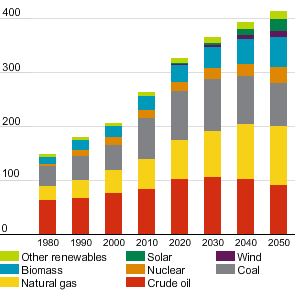PROJECTED GLOBAL ENERGY DEMAND TO 2050
million barrels of oil equivalent a day
Source: Shell analysis, January 2012
The world’s 7 billionth person was born in 2011. With five more people born every second, the planet is expected to be home to more than 9 billion by 2050. Asia’s rapidly expanding cities will absorb much of this growth, with three in four people living in urban centres, up from two in four today. Many millions of people will rise out of energy poverty. With higher living standards comes rising energy use. Energy demand could double by the middle of the century from its level in 2000.
Supplying this vital extra energy will become increasingly difficult. Conventional energy sources will struggle to keep pace, even with technological advances. With strong government support, renewables could meet up to 30% of the world’s energy demand by 2050, compared to 13% today, but getting to that level would require historically unprecedented growth rates for new forms of energy. Shell analysis shows that fossil fuels and nuclear could meet at least 70% of global energy demand in 2050.
Energy, water and food
The International Energy Agency (IEA) estimates that the world will need to invest some $38 trillion in infrastructure to meet projected energy demand to 2035 alone. At the same time, climate change remains a global threat, while countries are facing mounting tensions over fresh-water supplies and food prices.
A path to a more sustainable energy future will need an integrated approach. In 2011, Shell brought together specialists from the energy, water and food industries along with experts from governments and non-governmental organisations. The aim was to better understand the connections between these three essentials to life in the knowledge that climate change will intensify the stresses. Two factors stood out as the strongest levers for tackling these stresses: greenhouse gas regulation and pricing, and more sustainable urban development. For example, designing smarter, energy-efficient cities could help reduce demand for energy and water. Such cities would integrate transport, energy, water and waste systems much more effectively than today’s cities.
What we are doing today

In the future many more people will live
in cities.
The IEA issued a stark warning in late 2011 that without a bold change of policy direction, the world could lock itself into an insecure, inefficient and high-carbon energy system as early as 2017. It called for governments to introduce stronger measures to drive investment in efficient and low-carbon technologies. Failure to do this would lead to “irreversible and potentially catastrophic climate change”, said the IEA.
Shell believes a realistic price on CO2 emissions is essential to help spur greater energy efficiency and the development of cleaner technologies. But our response to the challenges of energy and climate change is not to wait for government policies or international coalitions to form. We are taking action today.
In all our major investments we consider the potential cost of a project’s CO2 emissions, which we set at $40 a tonne. We are producing more natural gas, the cleanest-burning and abundant fossil fuel that emits around 50% less CO2 than coal when used to generate electricity. We are helping to develop carbon capture and storage, which could be significant in reducing global greenhouse gases. Through the Raízen joint venture (Shell interest 50%) we are producing the lowest-carbon biofuel commercially available, ethanol from sugar cane in Brazil. We are also working to improve the energy efficiency of our own operations.
